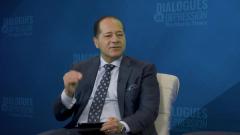
Shifting Paradigms: The Future Role of Rapid Acting Antidepressants
Experts discuss the need to review current clinical guidelines in light of the need for rapid-acting treatment, especially as first-line treatments for some patients.
Episodes in this series

Transcript
Greg Mattingly, MD: I’m going to ask you a question. I know Gus, you’re the moderator here, but I’ll ask a question. Because we’re researchers, you are expert teachers and educators. I’ve worked with you both, but we all 4 share something, and probably even more important, we’re all active clinicians. We have busy clinical practices, all 4 of us. So when you think about this new generation of antidepressants, do you think they’ll move to the top of the line eventually? Do you think they’ll move to the top of the line instead of being somewhere down in here?
Craig Chepke, MD, FAPA: That’s what I was alluding to with don’t wait to call the fire department. Use the medications that are going to be the most efficacious as soon as possible. You mentioned the hippocampal damage, and there is some evidence that that is progressive. That major depressive disorder [MDD], similar to how we think about schizophrenia or epilepsy, is a neuroprogressive disorder, and we don’t want to let that continue to happen. We need to be urgent with our patients who are living with MDD.
Gus Alva, MD, DFAPA: Agreed. If we have to wait 6 to 8 weeks for a full effect to kick in versus 1 week, [that’s a[ significant difference. We want to see a sustained benefit as opposed to it’s going to peter out. We definitely want to get that right. That’s ultimately going to make us actually now do more work, and that is [to] revisit our guidelines and take a look at how we might actually be more nimble and more flexible and helping out our patients further. I like that provocative point. That’s an excellent one our field needs.
Erin Crown, MHS, PA-C: I couldn’t agree more with you, Greg. These should absolutely be first-line agents and unfortunately our guidelines don’t yet support that, and our health care system in this country doesn’t yet support that, right. The way that it works to be able to get these kinds of medications, and so I think what we’re all sitting here saying, [which] you kind of started us off on, Greg, is that we need some change. We need some guidance. We’ve got some evidence to show how beneficial this can be. We need some change.
Greg Mattingly, MD: I’ll be a little provocative again. I think the FDA [US Food and Drug Administration] is gradually getting there. With our 2 newest agents that have been proved among the rapid-acting, they didn’t say you have to wait until people are treatment-resistant. They didn’t say you have to try an SSRI [[selective serotonin reuptake inhibitor] first. They said you can start with these [in the] first line and they gave them breakthrough status because they were rapid-acting. So they made them breakthrough status. I think we’re starting to move the needle about how we think about the urgency to treat.
Transcript was AI-generated and edited for clarity.
Newsletter
Receive trusted psychiatric news, expert analysis, and clinical insights — subscribe today to support your practice and your patients.


















